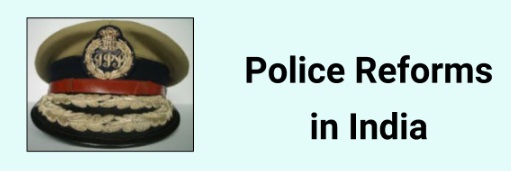Police Reforms in India : Important Topics for UPSC Exams

Police Reforms in India
Max Weber defined 'State' as an organisation that has a monopoly on the legitimate use of physical force.
- The police are the instrument of physical force of the State.
- They have to bear the burden of failure of other instruments of governance as well.
Due to Poor infrastructure and lack of trained officials incidents like Dimapur lynching (where mob entered the prison) occur. The Supreme Court has issued directives for police reforms in 2006 under Prakash Singh Badal Judgement, but the directives were not effectively implemented by the respective state Governments.
The Existing Policing System in India
- 'Public order' and 'Police' figure in the State list in the VII schedule of our constitution.
- The Police Act, 1861 is still the basic instrument governing the functioning of the Indian police.
- The Director General and Inspector General of Police is the head of a state police.
- States are divided into districts and a Superintendent of Police heads the district police.
Issues in Policing
- NHRC has made it very clear that “with every passing year, the evidence before the Commission mounts that there must be major police reforms in the country if the human rights situation is to be improved”
- Political authorities have a stronghold over police this nexus affects the credibility of the police too.
- Most of the times the State Police Training Schools where a large majority of policemen undergo training are ill equipped, starved of funds and staffed by unwilling instructors.
- It is general observation that the intelligence gathering efforts are devoted mainly to gathering information about major law and order problems, while adequate attention is not paid to collection of intelligence relating to commission of crimes.
- Since the police is the primary agency of the criminal justice system which protects human rights, it is essential to sensitise police personnel to gender issues.
- Gender disparity is another issue as in the criminal justice system, the representation of women is low in all wings and especially the police.
Various expert Bodies on Police Reforms
- National Police Commission (1977-81)
- Ribeiro Committee (1988)
- Padmanabhaiah Committee (2000)
- Malimath Committee (2002-03)
- Supreme Court Directives on Prakash Singh vs Union of India (2006)
- Second Administrative Reform Commission recommendation on Police Reform
Buy Printed Study Material for UPSC Pre General Studies (Paper-1)
Online Crash Course for UPSC PRE Exam
Supreme Court directives in Prakash Singh case
- Set up a Police Establishment Board (PEB) to decide transfers, postings, promotions and other service related matters of police officers of and below the rank of Deputy Superintendent of Police and make recommendations on postings and transfers above the rank of Deputy Superintendent of Police.
- Constitute a State Security Commission (SSC) to provide policy
guidelines and ensure that the state government does not exercise
unwarranted influence or pressure on the police.
Ensure that the DGP is appointed through merit based transparent process and secure a minimum tenure of two years. - Ensure that other police officers on operational duties (including Superintendents of Police in-charge of a district and Station House Officers in-charge of a police station) are also provided a minimum tenure of two years.
- Separate the investigation and law and order functions of the police.
- Set up a Police Complaints Authority (PCA) at state level to inquire into public complaints against police officers of and above the rank of Deputy Superintendent of Police in cases of serious misconduct, including custodial death, grievous hurt, or rape in police custody and at district levels to inquire into public complaints against the police personnel below the rank of Deputy Superintendent of Police in cases of serious misconduct.
- Set up a National Security Commission (NSC) at the union level to prepare a panel for selection and placement of Chiefs of the Central Police Organisations (CPO) with a minimum tenure of two years.
Suggestions to improve Policing System in India
- Community Policing can be promoted-
“Community Policing is an area specific proactive process of working with
the community for prevention and detection of crime, maintenance of public
order and resolving local conflicts and with the objective of providing a
better quality of life and sense of security”.
SMART Policing should be focused upon- SMART i.e. Strict and Sensitive, Modern and Mobile, Alert and Accountable, Reliable and responsive, Tech savvy and Trained. - Police Training- Training should focus on bringing in attitudinal change in police so that they become more responsive and sensitive to citizens’ needs.
- Gender Parity in Police force- The 2nd Administrative Reform Commission recommended that the representation of women in police at all levels should be increased through affirmative action so that they constitute about 33% of the police.
- Improvement in Forensic Infrastructure -There is need to expand the forensic facilities and upgrade them technologically. Every district or a group of districts having 30 to 40 lakhs population should have a forensic laboratory.
- Improvement in Intelligence gathering- The intelligence gathering machinery in the field needs to be strengthened and at the same time, made more accountable. Human intelligence should be combined with information derived from diverse sources with the focus on increased use of technology.
MODEL QUESTIONS
Q. Which of the following committee is not related with Police Reforms?
A. Ribeiro Committee
B. Padmanabhaiah Committee
C. Shekatkar Committee
D. Malimath Committee

